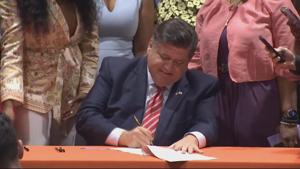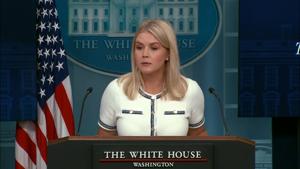Trump’s tariff revenue in doubt after appeals court ruling
President Donald Trump’s tariff revenue – a key source of funding for his political agenda and the GOP’s priorities – is in jeopardy after an appeals court rejected the president’s unilateral tariff authority.
Earlier this month, the Congressional Budget Office, the government’s official scorekeeper, estimated that Trump’s tariffs could bring in $4 trillion over the next decade. That’s nearly enough to cover the spending and tax cuts in the GOP’s massive One Big Beautiful Bill Act.
The U.S. Court of Appeals for the Federal Circuit affirmed a lower court ruling that invalidated the tariffs. Still, the court said the tariffs could remain in place while the administration appeals to the U.S. Supreme Court.
Trump’s Section 232 tariffs – those on steel, aluminum, copper, vehicles, and vehicle parts – remain legal and in place.
The Supreme Court is likely to decide the case.
An analysis from the Committee for a Responsible Federal Budget found that if the appeals court ruling is upheld by the Supreme Court, 71% of the projected tariff revenue would vanish. The nonprofit group said the CBO’s score would likely drop from a $4 trillion total deficit reduction through fiscal year 2035 down to $1.2 trillion.
Trump recently said that if the courts nix his tariffs, America could sink into a “Great Depression.”
“If a Radical Left Court ruled against us at this late date, in an attempt to bring down or disturb the largest amount of money, wealth creation and influence the U.S.A. has ever seen, it would be impossible to ever recover, or pay back, these massive sums of money and honor,” the president wrote on Truth Social. “It would be 1929 all over again, a GREAT DEPRESSION!”
The president’s attorneys told the appeals court the same thing. In a letter to the U.S. Court of Appeals for the Federal Circuit, Solicitor General D. John Sauer and Assistant Attorney General Brett Shumate warned that tariffs under the 1977 International Emergency Economic Powers Act must stay in place to prevent a financial disaster.
“Suddenly revoking the President’s tariff authority under IEEPA would have catastrophic consequences for our national security, foreign policy, and economy,” they wrote in a letter. “The President believes that our country would not be able to pay back the trillions of dollars that other countries have already committed to pay, which could lead to financial ruin.”
Attorneys for the administration told the court that Trump could use other laws to implement tariffs. Still, those wouldn’t work nearly as well as the International Emergency Economic Powers Act – the law that’s under review in the legal challenge of Trump’s tariffs filed by small businesses and some U.S. states.
“Other tariff authorities that the President could potentially use are short-term, not nearly as powerful, and would render America captive to the abuses that it has endured from far more aggressive countries,” Sauer and Shumate wrote in the letter. “There is no substitute for the tariffs and deals that President Trump has made. One year ago, the United States was a dead country, and now, because of the trillions of dollars being paid by countries that have so badly abused us, America is a strong, financially viable, and respected country again. If the United States were forced to pay back the trillions of dollars committed to us, America could go from strength to failure the moment such an incorrect decision took effect.”
Trump publicly predicted an economic collapse similar to the “Great Depression.”
“These deals for trillions of dollars have been reached, and other countries have committed to pay massive sums of money,” Sauer and Shumate wrote. “If the United States were forced to unwind these historic agreements, the president believes that a forced dissolution of the agreements could lead to a 1929-style result. In such a scenario, people would be forced from their homes, millions of jobs would be eliminated, hard-working Americans would lose their savings, and even Social Security and Medicare could be threatened. In short, the economic consequences would be ruinous, instead of unprecedented success.”
Latest News Stories


WATCH: IL state reps challenge IEMA-OHS responses to local agencies

Illinois takes over health insurance marketplace in 2026 amid skepticism
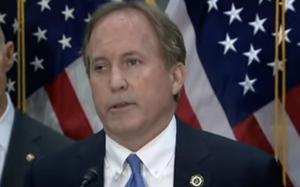
Judge expands restraining order against ‘Beto’ O’Rourke, adds ActBlue

Reversing Biden’s precedent, students complete FAFSA in minutes at beta-testing event
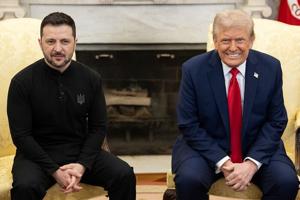
Trump, Zelenskyy to meet Monday in steps toward peace with Russia
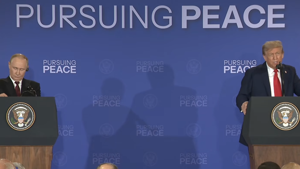
Possible ‘agreement’ reached in Trump-Putin meeting; more discussion likely

WATCH: Gun rights supporters celebrate 9th Circuit’s ruling against CA gun rationing law

Feds sue California over emission standards for trucks
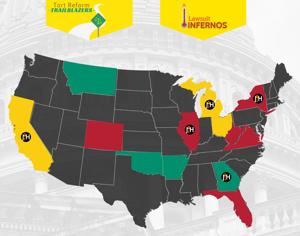
Illinois quick hits: ‘Lawsuit inferno’ bill takes effect after Pritzker signed 267 measures Friday

WATCH: UW-authored study on surgery times contradicts CMS basis for reimbursement cuts

State defends gun ban district court ruled unconstitutional







